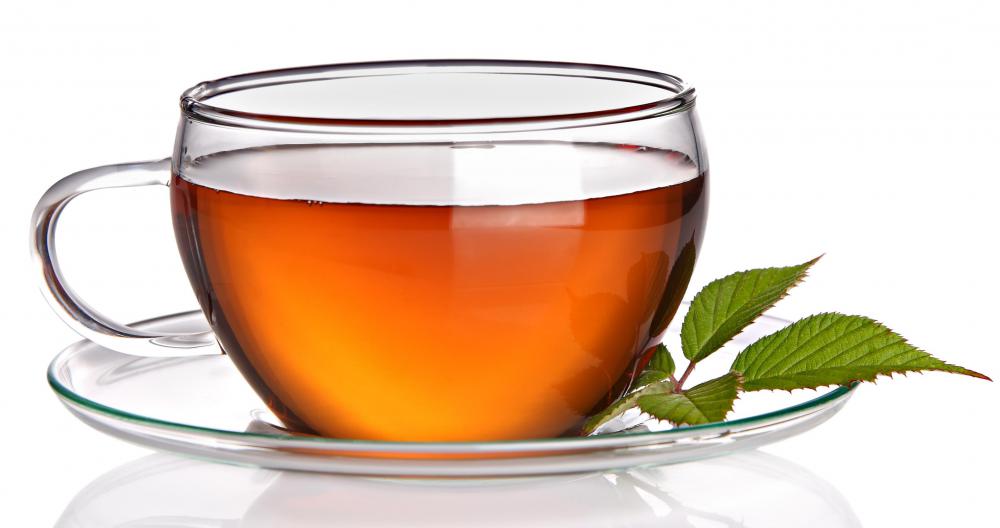At DelightedCooking, we're committed to delivering accurate, trustworthy information. Our expert-authored content is rigorously fact-checked and sourced from credible authorities. Discover how we uphold the highest standards in providing you with reliable knowledge.
What Are Tea Tannins?
Tea comes in a wide variety of flavors and styles, but tea tannins are found in all types of tea. Tannins are part of a naturally occurring class of molecules called “polyphenols,” otherwise known as “catechins.” The bitter taste experienced by some people after drinking tea is caused by the tannins. Due to their astringency, the tannins in tea can also create a dry, puckering sensation in a person’s mouth.
Tea tannins are also responsible for a tea’s brownish color. Darker teas generally have a higher concentration of tea tannins than lighter teas. For the most part, “true” teas, such as green tea, oolong, and black tea, have higher amounts of tannins than herbal teas. The concentration of tannins in a cup of tea also increases the longer the tea is allowed to steep. Thus, if a cup of tea steeps too long, the person drinking it might find it to have an excessively piquant or bitter taste.

The tannins contained in tea have often been confused with tannic acid, a chemical substance used to tan animal hides. This is a misconception. While tea tannins belong to the same class of chemicals as tannic acid, they are not the same. The types of tannins found in tea are also found in other foods, such as pomegranates, cranberries, cocoa, and red wine.

When consumed in moderation, tea tannins are considered to have certain health benefits. For instance, the tannins found in tea are believed to fight particular types of bacteria found in a person’s mouth, thus preventing bad breath and cavities. Tea tannins are also believed to have a calming, relaxing effect on some individuals, which can counteract the nervousness or jittery feeling sometimes caused by the caffeine present in certain types of tea.

Studies have suggested that the tannins found in tea, when consumed in large quantities, can interfere with a person’s absorption of plant-based iron. Consequently, individuals who suffer from low iron, or who do not obtain iron from meat-based sources, are advised to limit tea intake to no more than four cups per day. If an individual has concerns regarding low iron levels, it is also recommended that he or she not consume tea within an hour before or after eating a meal.

Many individuals believe that tea can help combat the common cold and other such illnesses. Some studies indicate that there might be a verifiable basis for that belief. The interference of tea tannins with iron absorption might prevent certain strains of illness-causing bacteria from absorbing the iron needed to thrive. This would effectively starve the bacteria and thus help a person’s immune system to fight off the illness.
AS FEATURED ON:
AS FEATURED ON:














Discussion Comments
Another benefit of tea is that tea is diuretic and can help balance blood pressure and blood sugar in moderation. It's also full of antioxidants and fights free radicals. Some people believe that tea can even protect from cancer.
I'm not sure if all of these benefits are thanks to the tannins in tea, but some of them must be.
@literally45-- I'm not an expert on this topic so I could be wrong. But the only negative side effect of tannins that I'm aware of is that too much can cause stomach upset.
Since tannins are an astringent and too much can make tea bitter, they can cause stomach acidity. People with sensitive stomachs or acid reflux may even experience stomach pain, nausea and vomiting.
That's why it's best to avoid very strong tea. Adding some milk to tea can help neutralize the tannins and prevent stomach upset though. I love black tea, but when I'm feeling unwell, I prefer tea with milk and ginger.
I had the assumption that the more tannins we consume, the better it is for health. But can tannins have negative side effects in excess?
I do drink a lot of tea but I do not think that I'm getting an excessive amount of tannins because I don't steep tea for very long. I like my tea light and mild.
Post your comments